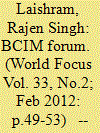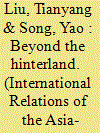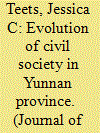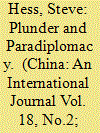|
|
|
Sort Order |
|
|
|
Items / Page
|
|
|
|
|
|
|
| Srl | Item |
| 1 |
ID:
110330


|
|
|
| 2 |
ID:
186177


|
|
|
|
|
| Summary/Abstract |
The scholarly literature on paradiplomacy has tended to focus overly on subnational governments in federal systems rather than those in unitary and centralized countries. However, it is important to note that some subnational governments in these countries have been increasingly proactive in international relations (IR). This study explores the paradiplomatic activities of Yunnan, a province in the south of China which, since the early 1990s, has actively engaged in cross-border cooperation. Combining the concept of paradiplomacy with the theory of actorness, this study first argues that Yunnan has been incentivized to conduct paradiplomacy through the decision of Beijing to open China’s borders; the inefficiency of the central government in managing border-related issues; and the interprovincial competition over economic and diplomatic clouts in the Mekong subregion. Second, this study argues that Yunnan’s new external affairs powers have been consolidated by a host of new opportunities stemming from the external environment. Third, it argues that Yunnan’s new external affairs powers have enabled it to leverage two broad instruments (infrastructure development and economic statecraft) to make neighboring countries more dependent on cooperation with it. And finally, it is argued that Yunnan’s role as an IR player has been acknowledged both by neighboring countries and by Beijing.
|
|
|
|
|
|
|
|
|
|
|
|
|
|
|
|
| 3 |
ID:
137369


|
|
|
|
|
| Summary/Abstract |
This article examines the evolution of the Yunnan model of civil society management, and through a pretest–posttest research design, finds that new regulations in 2010 create a larger role for the local state in developing civil society. These changes bring the Yunnan model closer to the more supervised model of social management pioneered by Beijing and away from the more autonomous model exemplified by Guangdong. This has important implications for the future regulation and development of civil society as the central government debates adopting one of these models as a national system of social management. While both the Guangdong and Beijing models encourage relaxing registration requirements, the social management model in Yunnan develops new channels for state guidance of civil society such as government training, funding, and project collaboration or supervision.
|
|
|
|
|
|
|
|
|
|
|
|
|
|
|
|
| 4 |
ID:
185614


|
|
|
|
|
| Summary/Abstract |
Chinese state firms are expected not only to profit but also to serve state interests. But the Chinese state is fragmented: border provinces are taking on an expanded role in China's global expansion and a broad range of firm activities could be defined as patriotic contributions. Through the case of Yunnan State Farms (YSF), a province-level state-owned enterprise, this article explores how state firms interpret and navigate multiple state interests while also pursuing profit. The firm's ability to profit depends on balancing the demands and support of different Chinese state actors while depicting itself as a development partner to the Lao state and a contributor to Sino-Lao diplomatic relations and border region stability. This case thus shows that, instead of YSF's behaviour being directed by the state, the firm exercises considerable latitude in defining its contributions to state interests through the expansion of rubber production as a driver of development.
|
|
|
|
|
|
|
|
|
|
|
|
|
|
|
|
| 5 |
ID:
122992


|
|
|
|
|
| Publication |
2013.
|
| Summary/Abstract |
This work compares differences in income between men and women in Yunnan, a southwestern province in China, in 2003. The data collection, conducted by co-authors Yang and Luo, was funded by the National Institute on Drug Abuse. The focus is on how illicit drug use shapes gender wage differences. Little research has been conducted which examines how drug use shapes wage differences in China and the existing work that does explore this relationship in the United States yields mixed results. Utilising basic ordinary least-squares (OLS) regression analysis, differences in earnings (log income) were examined, controlling variables for drug use, experience, marital status, educational attainment, Communist Party membership and other background variables. The data provide supporting evidence that current drug users reported higher income compared to others, all else being equal.
|
|
|
|
|
|
|
|
|
|
|
|
|
|
|
|
| 6 |
ID:
093753


|
|
|
| 7 |
ID:
159842


|
|
|
|
|
| Summary/Abstract |
Despite being known as “Asia's water tower,” Yunnan frequently experiences severe droughts which put pressure on local communities and state actors alike. This article examines the institutional arrangements that guide water governance strategies employed by local cadres in Yunnan province, showing how central control mechanisms in the Chinese administrative system undermine effective water governance at the local level. Findings obtained from field research in two counties in Yunnan with different levels of economic development and water resource access show that current institutional arrangements – including those regulating local cadre performance and the procedures to apply for project funding from higher-level governments – hinder the efficient use of infrastructure investment. Instead, provincial and prefectural water bureau officials use their authority to channel funding to those regions with an already positive track record of project applications.
|
|
|
|
|
|
|
|
|
|
|
|
|
|
|
|
| 8 |
ID:
112828


|
|
|
|
|
| Publication |
2012.
|
| Summary/Abstract |
In 2003 the Chinese Ministry of Education mandated the inclusion of environmental education in all elementary and secondary school curricula, but this mandate has gone widely unfulfilled. Under these circumstances, international and domestic NGOs in China are playing important roles in teaching Chinese children about environmental issues. While these roles have included the importation and dissemination of cosmopolitan conservation concepts and practices, their successful implementation often depends upon a sensitive engagement with the specifics of local culture and ecology. This essay discusses the experience of one domestic environmental NGO that develops local learning materials (xiangtu jiaocai) to help Chinese children 'learn the land beneath their feet'.
|
|
|
|
|
|
|
|
|
|
|
|
|
|
|
|
| 9 |
ID:
126270


|
|
|
|
|
| Publication |
2014.
|
| Summary/Abstract |
Mainland Southeast Asia -- long fought over and controlled by outside powers, from the colonial era through the Cold War -- is finally fending for itself, and then some. Cambodia, Laos, and Vietnam, which were once French Indochina, have grown at an impressive clip in recent years, with the last two taking their cues from China to blend communism and capitalism. Myanmar (also called Burma), once part of British India, is rapidly opening up to trade and foreign investment after decades of insular military dictatorship. And Thailand, the only Southeast Asian country never to have been taken over by a European colonial power, has proved resilient despite its prolonged political discord, humming along as the region's manufacturing, tourism, and service-sector hub.
|
|
|
|
|
|
|
|
|
|
|
|
|
|
|
|
| 10 |
ID:
172279


|
|
|
|
|
| Summary/Abstract |
This article conducts an investigation into Yunnan province to study the risks and opportunities associated with two institutional changes that have reshaped contemporary China: the decentralisation of power from the centre to provinces and the emerging agency of provinces in China's increasingly multilayered foreign policy. These changes have enabled Yunnan to develop a bridgehead strategy that positions the province as an economic corridor to the markets of Southeast Asia. While this has succeeded in fostering economic development, it has also created a complex set of transnational links that has contributed to the obstruction of central supervision, enabling local leaders to engage in regionalised corruption on a scale that has outpaced other Chinese provinces.
|
|
|
|
|
|
|
|
|
|
|
|
|
|
|
|
| 11 |
ID:
118688


|
|
|
|
|
| Publication |
2013.
|
| Summary/Abstract |
This article is based on a survey conducted over two years in Kunming and its vicinity, as well as in the rural areas of Yunnan Province. It considers the relations between administrators (officials) and the administered (families) in the process of adoption procedures. After going over the regular, albeit little noticed, practices of adoption in China, the text analyses the interactions and negotiations that take place, case by case, as families turn towards local authorities in order to legalise the presence of a child they have acquired and taken charge of. The main focus is on the multiple and also contradictory legislative frameworks having a bearing on institutional procedures that, in view of their internal contradictions, widen the margin of manoeuvrability for local officials as well as adoptive families. The two sides thus come up with non-legal norms concerning what is best suited to such situations.
|
|
|
|
|
|
|
|
|
|
|
|
|
|
|
|
| 12 |
ID:
124659


|
|
|
|
|
| Publication |
2013.
|
| Summary/Abstract |
Global processes and encounters with modernity have led to unique development patterns in ethnic minority areas in China. Rubber tree planting and rubber production, for example, have forged a link between tropical jungle villages like Mandi in Xishuangbanna (Yunnan Province) and China's booming car industry, and even the wider capitalist world system. As a result, the Dailue ethnic minorities in Mandi have experienced a social change from mechanical solidarity in rice agriculture to organic solidarity in market economic conditions. Such changes also expose Dailue society to increasing "modern" social risks, and this, in turn, has influenced religious practices. The traditional guardian spirit cults of the house (dubula hen), village (dubula ban) and region (dubula moeng) are held responsible for social risk management in Dailue culture. The increasing social risks have compelled people like the Dailue from Mandi to question and revisit the predicament of their folk religion, revealing the ongoing importance of spirit cults.
|
|
|
|
|
|
|
|
|
|
|
|
|
|
|
|
| 13 |
ID:
138155


|
|
|
|
|
| Summary/Abstract |
In 2002, Hu Jintao introduced his concept of a harmonious society (和 諧社會) in which he introduced the concept of putting people first (以 人為本), a guiding principle for many of the policies to come, including new resettlement regulations governing water resources and hydropower projects published in 2006. Drawing on fieldwork conducted in resettlement communities along the Lancang River in Yunnan province, this article analyzes the manner in which the local government manages the implementation of a more socially-oriented resettlement policy. While formerly local cadres tended to use force in order to fulfill policy requirements demanded from above, in line with new upper-level requirements, local governments have begun to devise a variety of strategies including soft coercion, negotiation, and propaganda work to implement resettlement policies, thereby providing evidence of a softer type of authoritarianism at the grassroots level
|
|
|
|
|
|
|
|
|
|
|
|
|
|
|
|
| 14 |
ID:
147287


|
|
|
|
|
| Summary/Abstract |
Transboundary flows of energy across Yunnan Province in China and to Southeast Asian states provide insight into the changing nature of borders and border areas. Rather than monolithic symbols of state sovereignty, China’s southwest borders in Yunnan can be more accurately characterised as zones of connectivity and exchange, serving a range of local, national and regional objectives. Energy production and distribution in and across Yunnan can be understood as functioning in a set of dynamic transnational processes that serve as economic and political bridges – increasing interaction and deepening regional integration – while also working to mitigate risk to China’s energy demands. In this article, energy projects in Yunnan and Southeast Asia demonstrate the ways border regions can respond to increasing globalisation, simultaneously strengthening national energy security while promoting regional interconnection and diplomacy. Thus, connections to and through a once peripheral region present an apparent contradiction: once rigid territorial borders are increasingly characterised by transboundary infrastructure development and exchanges of energy, capital and diplomacy, while promoting broader, diversified national energy security objectives – essentially strengthening national security through transnational energy projects. This article investigates how energy development works to shape Yunnan’s role as an “energy conduit,” while advancing both transnational and national geopolitical objectives, and thus, suggesting that these projects can be understood as trans-political in nature.
|
|
|
|
|
|
|
|
|
|
|
|
|
|
|
|
|
|
|
|
|